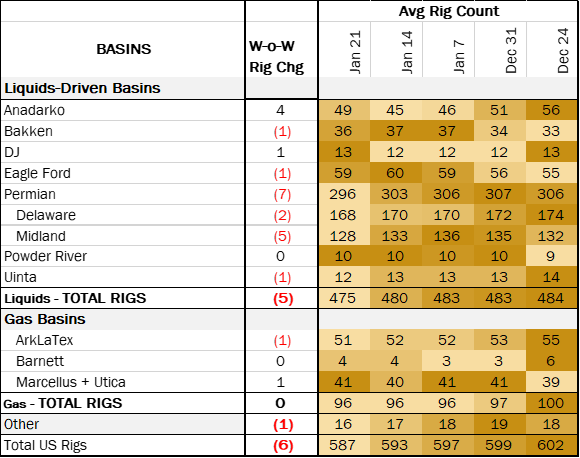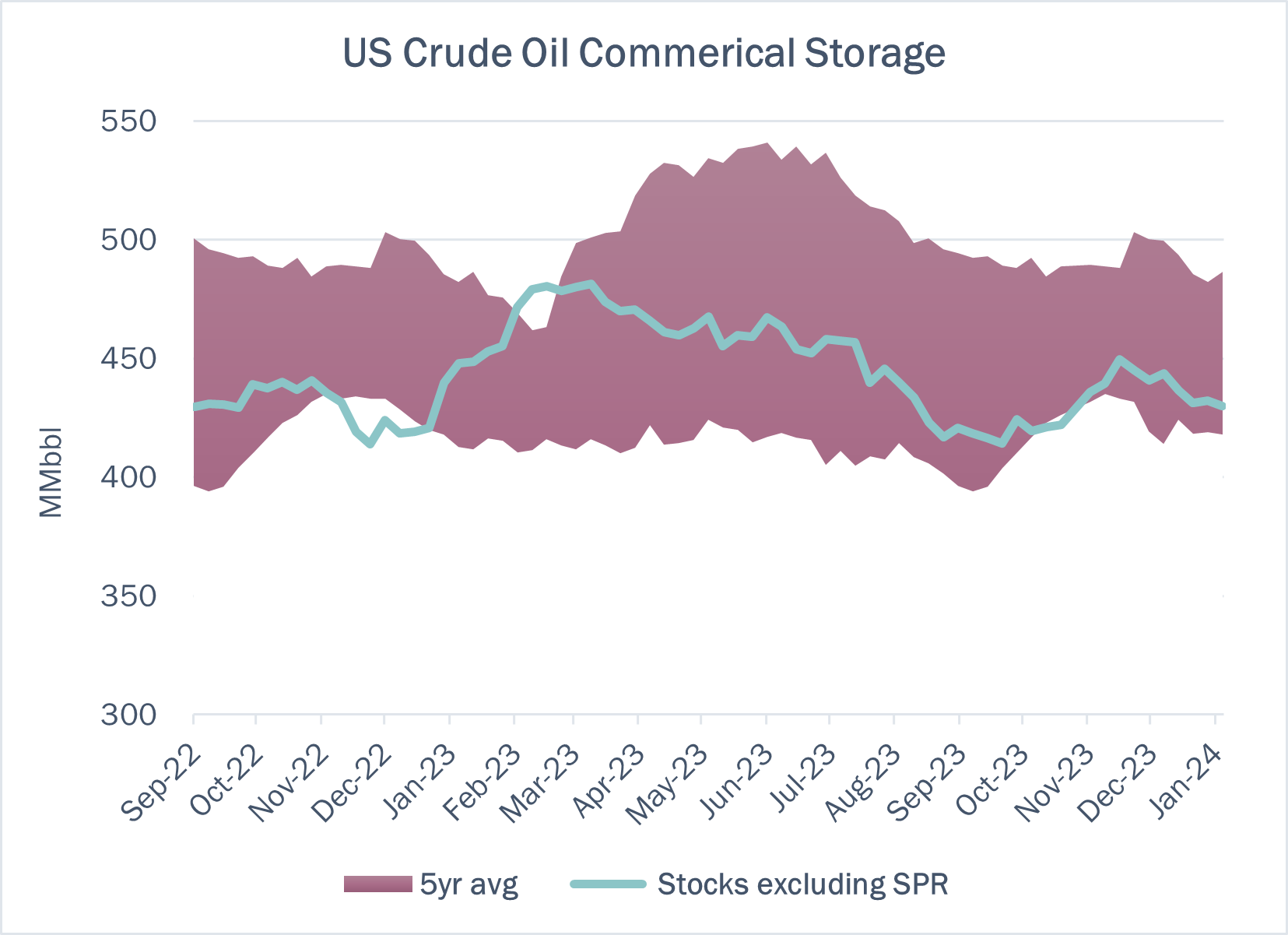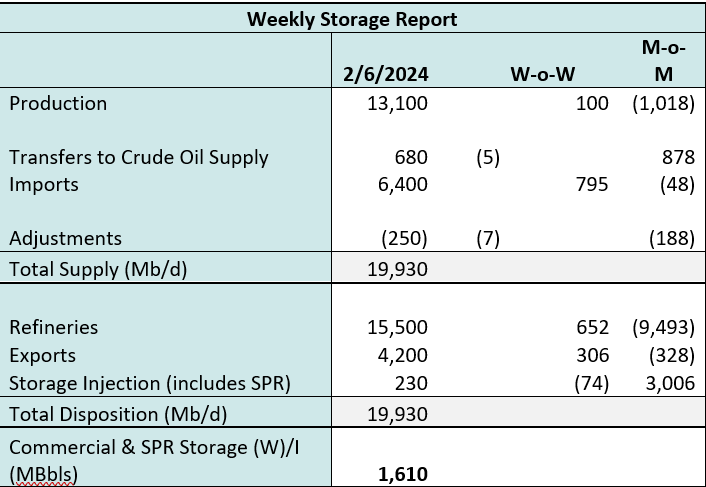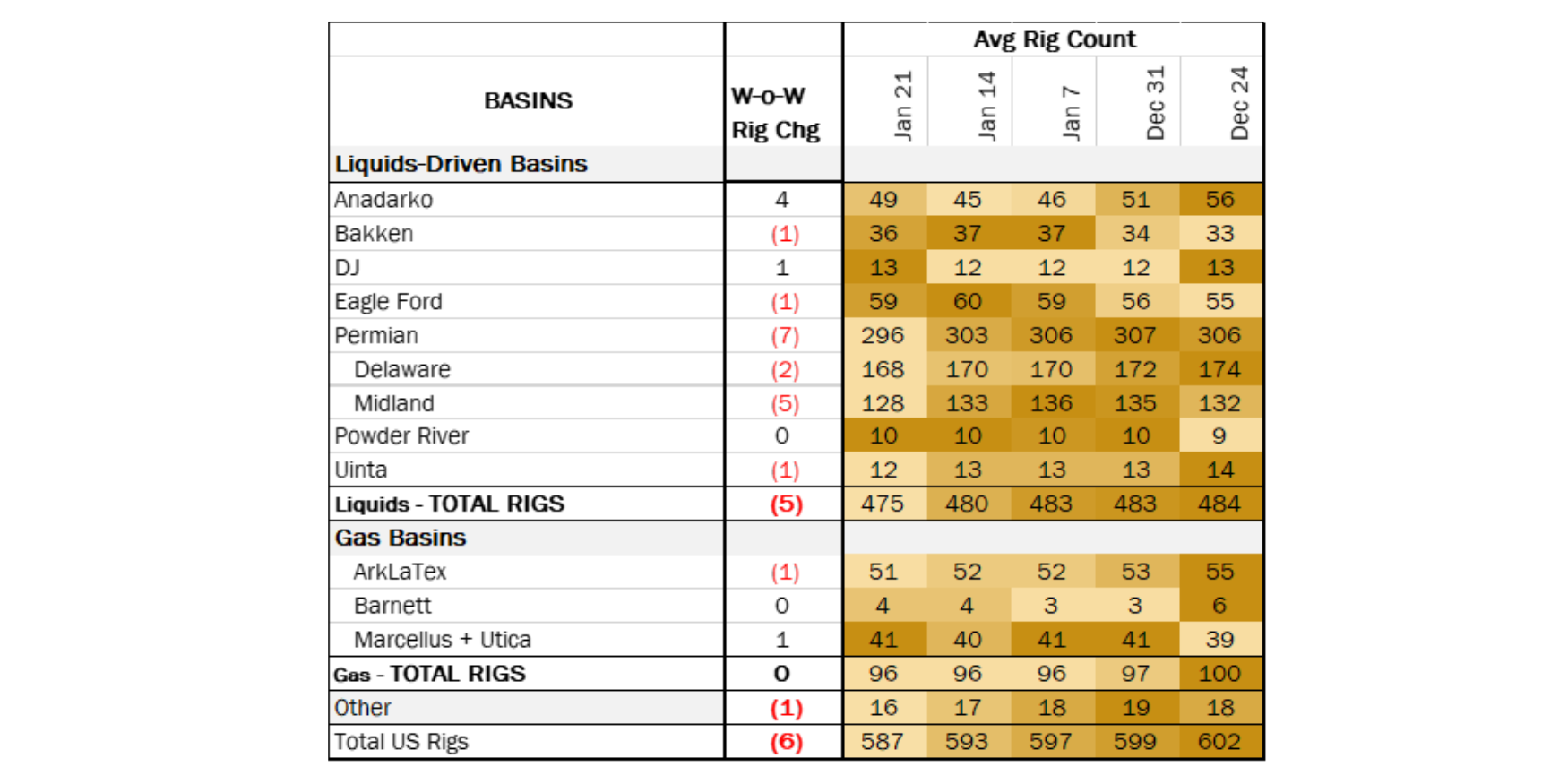Executive Summary: Rigs: The total US rig count decreased by 6 rigs for the week ending January 21. Infrastructure: As the Trans Mountain Pipeline Expansion (TMX) moves closer to start-up, the cost to US refiners and midstream operators is coming into sharper view. Storage: East Daley expects a build of 1.61 MMbbl in commercial and Strategic Petroleum Reserve (SPR) inventories for the week ending January 26.
Rigs:
The total US rig count decreased by 6 rigs for the week ending January 21. The rig count now sits at 587, down from 593 rigs the previous week. Leading the way in liquid-driven basins are the Anadarko and Permian. The Anadarko gained 4 rigs W-o-W after having suffered losses since December 24. This was no match for the 7 rigs lost in the Permian, however. Overall, liquid-driven basins lost 5 rigs W-o-W.

Anadarko operators on Energy Transfer (ET) systems added 3 out of the 4 rigs. Permian operators in the Delaware and Midland areas dropped 2 and 5 rigs, respectively. Major operators Occidental Petroleum (OXY), Continental Resources (CLR), and ExxonMobil (XOM) were behind the decline in Permian activity, each dropping 1 rig.
Infrastructure:
As the Trans Mountain Pipeline Expansion (TMX) moves closer to start-up, the cost to US refiners and midstream operators is coming into sharper view. Refiners are set to pay $20MM more a day, or $1.8B per quarter, for Canadian imports as a result of the project.
The forward curve for Western Canada Select (WCS), a Canadian heavy sour barrel, has increased by $6/bbl vs WTI prices in 2024 due to the expected start of TMX. The tightening spread reflects more competitive pricing for Canadian barrels as TMX opens access to Pacific markets.

In the Crude Hub Model, East Daley models the expansion from Alberta to British Columbia coming online by the end of 1Q24. We expect TMX to initially displace about 470 Mb/d of heavy sour crude imports, affecting throughput at several pipelines and terminals. Just as important will be the project’s impact to Canadian crude prices, and the gut punch US refiners will experience once prices increase for Canadian barrels.
US refiners import about 3.8 MMb/d from Western Canada. Assuming oil diversions to TMX are not replaced, buyers would pay $20MM more a day for the remaining ~3.3 MMb/d of imports based on recent increase in WCS prices, or $1.8B per quarter.
The price for a WCS barrel has historically been heavily discounted to other crude oils of similar quality, including Mars and Poseidon (Gulf of Mexico heavy sour barrels) and Maya (Mexico heavy sour barrel). The WCS barrel has a long journey to get to market, roughly 1,700 miles to reach PADD II area refiners in the Midwest, and another 300 miles to the Gulf Coast. Additionally, the lack of spare pipeline egress from Canada creates congestion and contributes to the heavy WCS discounting. That advantage for US refiners will be curtailed with TMX.
Storage:
East Daley expects a build of 1.61 MMbbl in commercial and Strategic Petroleum Reserve (SPR) inventories for the week ending January 26. We expect total US stocks, including the SPR, will close at 780.91 MMbbl.

The US natural gas pipeline sample, a proxy for change in oil production, increased by 4.2% in liquids-focused basins. The Williston Basin saw a significant change, increasing 22% W-o-W gaining back production lost during Mid January’s winter freeze. The Permian Basin saw an increase of 5.34% W-o-W. The Williston Basin has high pipeline sample coverage at ~100%, whereas the Permian Basin’s pipeline sample coverage is at ~40%. We expect US crude production to return to 13.1 MMb/d, the level hit prior to the mid-January winter freeze-off.
According to US bill of lading data, US crude imports increased by ~765 Mb/d W-o-W to 6.4 MMb/d. More than 60% of the supply originated from Canadian pipelines into the US, with the remainder largely coming from ships carrying crude from Mexico, Brazil and Nigeria.

As of February 2, there was ~1,284 Mb/d of refining capacity offline, including downtime for planned and unplanned maintenance. EDA expects gross crude inputs into refineries to increase by 4.4% W-o-W, coming in at ~15.5 MMb/d.
Vessel traffic monitored by EDA along the Gulf Coast decreased W-o-W. There were 21 vessels loaded for the week ending January 27 and 25 the prior week. EDA expects US exports to be 4.2 MMb/d.
The SPR awarded contracts for 2.1 MMbbl to be delivered in February 2024. The SPR has 358.000 MMbbl in storage as of 26, 2024.
Regulatory and Tariffs
Presented by ARBO
Tariffs:
EPIC Crude LLC The expired Motiva refinery and Total Petrochemicals incentive rate has been canceled, effective February 1, 2024. (FERC No 12.2.0 IS24- 157, filed January 19, 2023)
Andeavor Logistics Rio Pipeline LLC A new destination was established in Midland County, TX for the Energy Transfer interconnect from existing origins, effective January 24, 2024. (FERC No. 2.20.0 IS24-161, filed January 22, 2024)
The above information is provided by ARBO’s Oil Pipeline Tariff Monitor. For more information on regulatory proceedings or tariff rates, please contact please contact Corey Brill via email at [email protected] or phone at 202-505-5296. https://www.goarbo.com/


